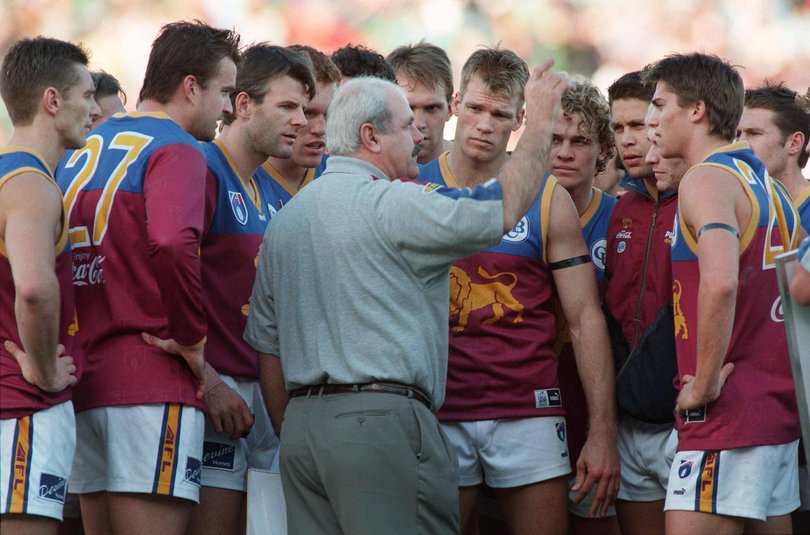JUSTIN LANGER: Ben Stokes, Usman Khawaja under fire over first Ashes Test but teams have plans they stick to
JUSTIN LANGER: It’s hard to tell from the outside, but England sticking to their guns is not that crazy and why can’t a bloke play golf?
Winning isn’t everything, they say.
But in the unforgiving arenas of sport, business and politics, winning is the currency that buys credibility, confidence and the right to continue.
Aussie rules legend Leigh Matthews wasn’t just an elite player; some say he was the greatest ever.
Sign up to The Nightly's newsletters.
Get the first look at the digital newspaper, curated daily stories and breaking headlines delivered to your inbox.
By continuing you agree to our Terms and Privacy Policy.An eight-time All-Australian, four-time Premiership player, Brownlow medallist, Team of the Century member, “Lethal Leigh” had a playing philosophy that was brutally simple. He believed in contested footy and that games were won by those willing to go hardest at the ball.
Simply put, Matthews was as unbreakable and as tough as granite.
As a coach, he won a flag with Collingwood, before revolutionising the Brisbane Lions from cellar-dwellers to a three-peat dynasty. His tactical acumen matched his playing ferocity. He understood that premierships required more than talent and that sustained success demands resilience, structure, and an unshakeable belief in the team system.
An inspiration, his philosophy is based on having seen it all in the industry he mastered. When he talks, we tend to listen.
Sitting in a boardroom 15 years ago, Matthews told a group of aspiring coaches that culture was simply defined by winning. His philosophy was that winning was the essence of a good culture.
He said “I’ll tell you what culture is. Culture is winning. If you win, they will say you have a good culture, if you lose, they will say you have a bad culture.”
He then told us, “If you are winning, everyone is happy. The board is happy, the fans are happy, the coaches are happy, and the players are happy. If the players, the board, the fans and the coaches are happy then the wives are happy, and we all know what that say about happy wives and happy lives.
Out comes the knives for coaches, players and administrators alike. Talkback radio becomes a tribunal, social media an execution ground.
“So, as a young coach, learn what it takes to win. Put all your attention into that and everything will be OK.”
With that he smiled and closed his presentation.
In Australia, where tall poppy syndrome meets our fierce competitive spirit, we understand better than most that victory validates everything. Your strategy, your leadership, your right to be heard, is never questioned. People say nice things about you, and you feel untouchable.
But there’s a flipside.
Lose and look out. There is no fun in losing.
As an example, just look at the fallout from England’s loss in last weekend’s first Ashes Test.
First came the criticism. Out comes the knives for coaches, players and administrators alike. Talkback radio becomes a tribunal, social media an execution ground.
Suddenly the coach who was a visionary doesn’t know what he’s talking about, the captain is inflexible, and the players are poorly prepared and more interested in golf than cricket.
That’s all according to the critics of course.
All who have a right to their opinion. Some who have earned that right more than others.
A few reckless cricket shots, one of the greatest innings ever played by an opponent (Travis Head), and suddenly all sense of optimism and hope are extinguished.
It’s all doom and gloom.
Both England and Australia should take some of the criticism as it was meant.

Both teams batted poorly in their first innings. Exciting as the action was, nerves, or a lack of mental preparation for batting on a Perth pitch, was horribly exposed.
England’s second innings performance was worse, with little respect given to the conditions, the opposition bowlers, or five days that makes up a Test match. They will know that and will take it on the chin.
It was a relief seeing the ICC (International Cricket Council) rate Optus Stadium pitch as very high. There was nothing wrong with the pitch. In this instance the players must take responsibility for the two-day result. This is always the case.
But now, what has happened has happened and what happens next is what really counts.
Pressure does funny things to people and poor decision-making inevitably follows. Desperation clouds judgement. The temptation to change course becomes overwhelming. This is often a fatal mistake.
Strong leadership in tough times becomes non-negotiable. When adversity strikes, weak leaders panic or deflect blame. Strong leaders absorb the pressure, maintain clarity and hold the line.
Much has been made this week about England declining to play a pink ball practice game against the PM’s XI in Canberra this weekend.
On the surface another hitout sounds like a good idea, but England’s leaders have chosen to stick together and prepare together in Brisbane, rather than having some of their players in Canberra and others in Brisbane.
England also have their second team in Australia — the England Lions — who are scheduled to play the Canberra fixture.
Last Friday morning the England team walked from their hotel to Optus Stadium together. They then crossed the oval like a scene from Braveheart.

This vision was shown on a UK TV station, and I hadn’t seen it until after the first day’s play where England had taken a strong advantage. The image was strong and unified.
Asking about this, the very clear message from those within their camp was that one of Brendon McCullum (coach) and Ben Stokes’ (captain) strengths was their ability to bring the team together.
They are sticking with their schedule and what they believe is best for their group. We can agree or disagree, but they are standing firm. I, for one, respect that.
Then there has been the growing criticism of the players playing too much golf.
Not that long ago, players were criticised for spending too much time in their hotel rooms playing on their PlayStations. Before that for drinking too much beer. These were questioned only if the team lost.
Boony broke the record for drinking cans of beer on the way to England in 1989. Australia won the Ashes, and the series is regarded as one of this country’s great cricket moments. Had we have lost; there would have been a national enquiry.
Usman Khawaja played golf leading into the Test match and he is put under the microscope when the disc in his back gave way. For anyone who has experienced this pain, you will know there are few things more uncomfortable.
“Drop him” came the calls.
Drop him? In all the uncertainty leading into the series, he was the one top order player inked into the eleven. Dropping him now, which selectors chose not to do on Friday, would go against all pre-series plans.
That wouldn’t make sense after winning the first Test. He also knows the Gabba, the venue for the second Test, better than just about any other player.
Travis Head was sublime, as he has been for the past few years in Test cricket, but he has time when Khawaja finishes to bat wherever he wants to. He’s batting that well at present, that it doesn’t matter where he lines up.
Anyone who knows Stokes or Steve Smith understand that no-one in the world trains harder, practices more. Both are superstars of the game. Both are ‘golf tragics’, as are Mitchell Starc and Head. All four played extraordinary to significant parts in the whirlwind last Test. Their preparation hasn’t been called out.
The point is, we are quick to find the weak links and squeeze them until they fold.
It is no different in business, where a few bad quarters, a downturn in commodity prices or an increase in inflation and interest rates, quickly see the CEO who was an imaginative, creative leader become yesterday’s news. The board grows restless. Shareholders demand change. Former allies distance themselves.
Politics operates on the same brutal logic. The party that wins has a mandate that goes unquestioned.
In contrast the opposition leaders who never make it to The Lodge, have their ideas dismissed, their policies unexamined, their leadership perpetually questioned, simply because they haven’t won the ultimate prize.
The rise of the winner can be meteoric, the descent of the loser swift and merciless.
When teams win, magic happens. Players trust the coach’s game plan. Businesses that dominate their markets attract the best talent and command premium prices. Political parties that win elections implement their vision rather than watching from opposition benches.
When they lose, they often cannibalise themselves and lose the plot. Great ones don’t.
On Thursday a new chapter of the Ashes opens. Who will stand firm? Who will follow the great Matthews’ belief in resilience, structure, and an unshakeable belief in the team system?
Winning validates everything. Losing questions everything. Navigating the space between the two is where true leadership proves itself, where champions are forged and where the greatest sporting, business and political triumphs are born, or die.
